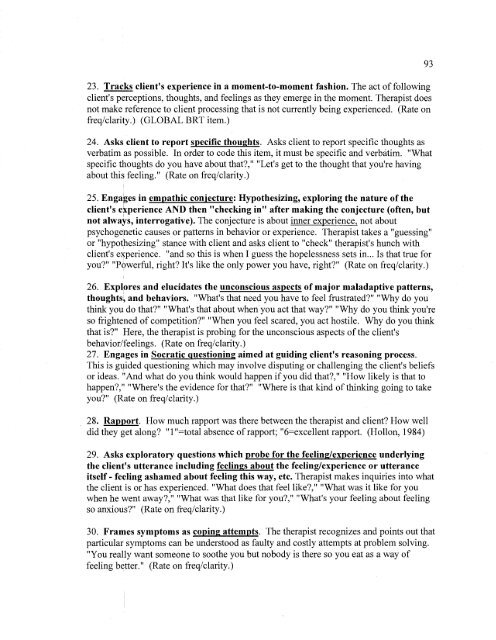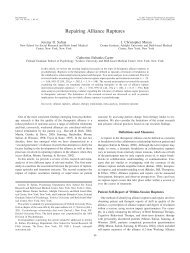Download - The Safran Lab
Download - The Safran Lab
Download - The Safran Lab
Create successful ePaper yourself
Turn your PDF publications into a flip-book with our unique Google optimized e-Paper software.
23. Tracks client's experience in a moment-to-moment fashion. <strong>The</strong> act of following<br />
client's perceptions, thoughts, and feelings as they emerge in the moment. <strong>The</strong>rapist does<br />
not make reference to client processing that is not currently being experienced. (Rate on<br />
freq/clarity.) (GLOBAL BRT item.)<br />
24. Asks client to report specific thoughts. Asks client to report specific thoughts as<br />
verbatim as possible. In order to code this item, it must be specific and verbatim. "What<br />
specific thoughts do you have about that?," "Let's get to the thought that you're having<br />
about this feeling." (Rate on freq/clarity.)<br />
25. Engages in empathic conjecture: Hypothesizing, exploring the nature of the<br />
client's experience AND then "checking in" after making the conjecture (often, but<br />
not always, interrogative). <strong>The</strong> conjecture is about inner experience, not about<br />
psychogenetic causes or patterns in behavior or experience. <strong>The</strong>rapist takes a "guessing"<br />
or "hypothesizing" stance with client and asks client to "check" therapist's hunch with<br />
client's experience, "and so this is when I guess the hopelessness sets in... Is that true for<br />
you?" "Powerful, right? It's like the only power you have, right?" (Rate on freq/clarity.)<br />
26. Explores and elucidates the unconscious aspects of major maladaptive patterns,<br />
thoughts, and behaviors. "What's that need you have to feel frustrated?" "Why do you<br />
think you do that?" "What's that about when you act that way?" "Why do you think you're<br />
so frightened of competition?" "When you feel scared, you act hostile. Why do you think<br />
that is?" Here, the therapist is probing for the unconscious aspects of the client's<br />
behavior/feelings. (Rate on freq/clarity.)<br />
27. Engages in Socratic questioning aimed at guiding client's reasoning process.<br />
This is guided questioning which may involve disputing or challenging the client's beliefs<br />
or ideas. "And what do you think would happen if you did that?," "How likely is that to<br />
happen?," "Where's the evidence for that?" "Where is that kind of thinking going to take<br />
you?" (Rate on freq/clarity.)<br />
28. Rapport. How much rapport was there between the therapist and client? How well<br />
did they get along? "l"=total absence of rapport; "6=excellent rapport. (Hollon, 1984)<br />
29. Asks exploratory questions which probe for the feeling/experience underlying<br />
the client's utterance including feelings about the feeling/experience or utterance<br />
itself - feeling ashamed about feeling this way, etc. <strong>The</strong>rapist makes inquiries into what<br />
the client is or has experienced. "What does that feel like?," "What was it like for you<br />
when he went away?," "What was that like for you?," "What's your feeling about feeling<br />
so anxious?" (Rate on freq/clarity.)<br />
30. Frames symptoms as coping attempts. <strong>The</strong> therapist recognizes and points out that<br />
particular symptoms can be understood as faulty and costly attempts at problem solving.<br />
"You really want someone to soothe you but nobody is there so you eat as a way of<br />
feeling better." (Rate on freq/clarity.)<br />
93



